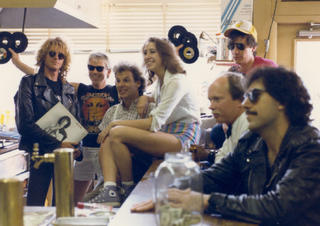 Time capsule: The hipster staff at Domino's Doghouse
Time capsule: The hipster staff at Domino's Doghouseenthusiastically welcomed SLANT to the scene in 1985
(Photo Credit: F. T. Rea)
In SLANT’s first year of existence, 1985, desktop publishing was just catching on. Nintendo entered the home video game market and America Online was founded. Seven New Jersey teens were busted for accessing a Pentagon computer using an ordinary telephone line. Mikhail Gorbachev took the reins of power in the USSR and quickly implemented his “glasnost” policy. France's government finally admitted its intelligence officers actually did sink Greenpeace’s Rainbow Warrior. In Richmond times were changing, too, as the 6th Street Marketplace and The Diamond opened that same year.
The first issue of SLANT was a 16-pager; it cost a quarter. In the 20 years since SLANT has gone through a number of format changes -- from twice-a-week handbill, to monthly tabloid, to weekly newsletter, etc. (And, there was a nearly-eight-year hiatus. After a comeback last year it is now being published on a once-a-month basis.)
SLANT on the masthead said up-front that the material presented would come from a point of view; no tricks would be employed to convince anyone otherwise. My hope was then, and remains today, that a thinking person will see SLANT’s admitted directness, and consider that all reportage ultimately comes from some vantage point. Of course, this doesn’t get into whether the report is fair, or even honest.
Today SLANT remains as independent as it gets. From the start my inspiration came from free thinkers who, in their day, found an original way to have their say. Among others they included: the American pamphleteers of the 1770’s, who fomented revolution; the French artist who used lithography to become the father of modern political cartooning, Honore Daumier (1808-1879); Spanish surrealist filmmaker Luis Bunuel (1900-1983), whose startling films spawned riots in the early 1930s; crusading independent journalist/newsletter publisher I. F. Stone (1907-1989); underground comix artist/publisher R. Crumb, who sold his Zap Comix out of a baby carriage on the streets of San Francisco. (Crumb was born in 1943 and is still alive.)
In its first issue SLANT mocked Richmond’s new 6th Street Marketplace with a cartoon of mine and it featured an essay -- “All Art Becomes Political” -- in which I asserted that art, of any type, regardless of its subject matter, is inevitably classified by viewers/listeners as either supporting the establishment or challenging it. Moreover, same as it ever was, wealthy people know what they like to see, and hear, etc. They encourage what they like and they support artists who cater to that taste.
Therefore, if you see or hear art that has been conveyed to you by way of an expensive process, you should bear in mind that fat cats hired everybody onboard. Of course that rule doesn’t label the art, or the fat cats, as good or bad, right or wrong.
In our modern society art-makers -- whether they draw, write, or make music -- who go against the grain, don’t usually make much money. Today money buys credibility. Like, if you don't have money, what could you know? A person without property is largely ignored, even distrusted.
Sad? Yes. But it's not evil. It's just the way it is. We live within a crowded society that -- for the time being -- trusts its wealthy class and is content with its conformist way of life. History suggests that if times get tougher that will change.
Whatever else it may seem to be, or not, SLANT is not a copycat, and it is locally produced. Ads are laughably cheap. Submissions are always welcome, and sometimes used. Pick up a copy of SLANT, dear reader, because you still can. History suggests that if times get tougher that could change, too.
-- 30 --

No comments:
Post a Comment